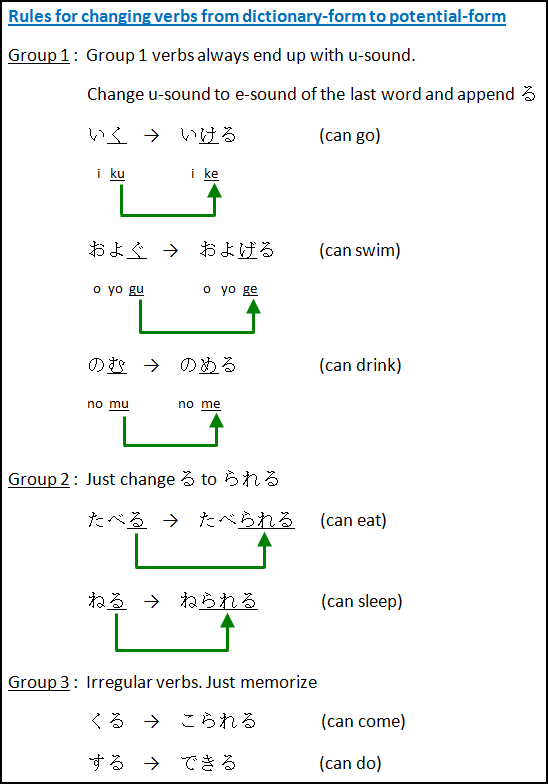- Home
- Intermediate Lessons
- Potential form and dekiru
Potential Form 可能形 (kanoukei) & dekiru -
Intermediate Lessons: 5
You may have come across potential form (or potential verb) in Japanese if you are at the intermediate level. It's one of the 2 ways to express ability and possibility to do something in Japanese.
Another way is to convert a verb into its noun-form and append ができる (ga dekiru) to it.
It's very simple to convert a Japanese verb into its noun-form. To do that, simply append こと(koto) to the dictionary-form of any verb.
For example, 話す (hanasu) becomes 話すこと (hanasu koto), 読む (yomu) becomes 読むこと (yomu koto).
By appending ができる (ga dekiru) to a noun or a verb in its noun-form, as shown in the following sentence patterns, you can express the ability and possibility of performing an action.
A. Noun ができる (Noun ga dekiru)
OR
B. Verb + こと ができる (Verb+koto ga dekiru)
Note: Only noun that is able to connect with する (suru) verb can be used here.
Let's use some examples to show how to use the above sentence patterns...
A. Using Noun ができる
|
1. |
私はテニスをします。 becomes 私はテニスができます。 |
|
2. |
私はスキーをします。 becomes 私はスキーができます。 |
B. Using Verb + こと ができる
|
1. |
私は日本語を話します。 becomes 私は日本語を話すことができます。 |
|
2. |
ここで写真を撮ります。 becomes ここで写真を撮ることができます。 |
Japanese Potential form or 可能形 (kanoukei)
To express ability or possibility, we have one more expression... Potential verb or Potential form. The meaning of "can" has already been included in the verb without using できる.
Rules for Changing Dictionary-form to Potential-form
The following are the rules for the 3 groups of Japanese verbs.
Group 1 Verbs
Group 1 verbs always end up with words containing u-sound.
To change group 1 verbs to potential-form, change the u-sound to e-sound in the last word. After that append る (ru) to the changed words and you will get the potential-form of the verb.
For example, this group 1 verb よむ (yomu) ends up with む (mu). If you change the u-sound to e-sound, む (mu) becomes め (me). Adding る (ru) at the end, you will get よめる (yomeru).
Let's look at one more example, this group 1 verb はしる (hashiru) ends up with る (ru). If you change the u-sound to e-sound, る (ru) becomes れ (re). Adding る (ru) at the end, you will get はしれる (hashireru).
Group 2 Verbs
Changing group 2 verbs from dictionary-form to potential-form is much simpler.
All group 2 verbs end up with る (ru). To change to potential-form, simply replace る (ru) with られる (rareru) and you will get the potential-form of the verb.
For example, this Japanese verb たべる (taberu) is a group 2 verb. To change to potential-form, replace る (ru) with られる (rareru) and you will get たべられる (taberareru).
I will use another example to show the change. This group 2 verb ねる (neru) means go to bed. Change る (ru) to られる (rareru) and you will get ねられる (nerareru).
Group 3 Verbs
Group 3 verbs are irregular verbs. You just have to memorize them.
The potential-form of くる (kuru) is こられる (korareru) and the potential-form of する (suru) is できる (dekiru).
In summary, the following diagram shows the rules when changing dictionary-form to potential-form for Japanese verbs.

So you have 2 ways to express the meaning of ability or possibility in Japanese.
For example, the following 2 sentences mean the same thing... "I can speak Japanese".
- 私は日本語を話すことができます。
watashi wa nihongo wo hanasu koto ga dekimasu
- 私は日本語が話せます。
watashi wa nihongo ga hanasemasu
Note: When using potential form, you have to change the particle from を (wo) to が (ga). This was what I were taught by my teacher in the beginning. However, I later found out that this is not always the case. Depending on situations, を (wo) can also be used.
We were told to use が (ga) because our teacher didn't want us to be confused when we were first learning the potential form. So in this lesson, I will still use が (ga) for the particle.
And since all potential verbs are Group 2 verbs, it's easy to change a potential verb to its other forms. Following the rules for group 2 verbs,
- masu-form : る → ます
- ta-form : る → た
- nai-form : る → ない
- nakatta-from : る → なかった
For example, using the potential verb 話せる (hanaseru), which means "can speak"...
- masu-form : 話せる → 話せます
- ta-form : 話せる → 話せた
- nai-form : 話せる → 話せない
- nakatta-from : 話せる → 話せなかった
Potential verbs can also be applied to the polite style. Using the same example,
- Present Affirmative : 話せる → 話せます
- Present Negative : 話せる → 話せません
- Past Affirmative : 話せる → 話せました
- Past Negative : 話せる → 話せませんでした
More Examples on Using Potential form and dekiru
Let's practise using both ways to express ability or possibility with more examples...
|
1. |
兄は泳ぐことができます。 |
|
2. |
母は日本料理を作ることができます。 |
|
3. |
弟は自転車に乗ることができます。 |
|
4. |
明日パーティーに行くことができません。 |
|
5. |
昨日晩御飯を食べることができませんでした。 |
Ready Set Speak Sale! Get up 40% OFF Forever Discount on Premium or Premium PLUS plan! Ends on 19 April 2024
The link above is an affiliate link, which means that I would earn a commission (at no extra cost to you) if you do end up purchasing the related learning course.
Previous - Lesson 4: Japanese Grammar tame
Next - Lesson 6: ようになる you ni naru
Buy me a coffee








Facebook Comments
Don’t see the comments box? Log in to your Facebook account, give Facebook consent, then return to this page and refresh it.